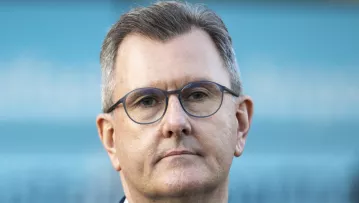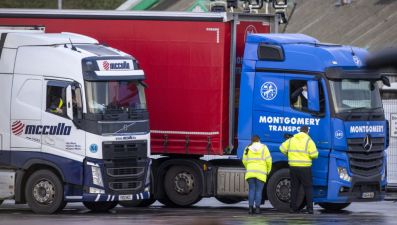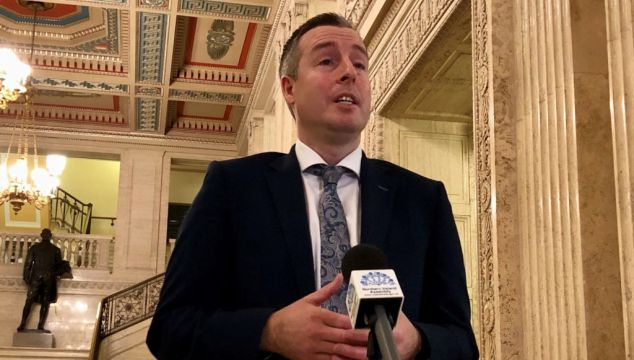The North's First Minister Paul Givan is expected to announce his resignation by the end of the week, a senior DUP source has said.
It comes amid the party’s protest against the Northern Ireland Protocol and follows his colleague Edwin Poots’ decision to order a halt to agri-food checks at ports in the North.
The European Commission has said the decision by DUP Agriculture Minister Mr Poots to stop the checks creates “further uncertainty and unpredictability”.
The PA news agency understands senior DUP figures are meeting later to confirm the timing of Mr Givan’s resignation statement, which could come as early as Thursday.
The resignation of the First Minister would automatically remove Sinn Féin deputy First Minister Michelle O’Neill from office.
In those circumstances, other ministers in the administration could still remain in place. However, the Executive could not make any significant decisions.
That would prevent the coalition from agreeing a three-year budget – a spending plan that is currently out for public consultation.
A planned official state apology by Mr Givan and Ms O’Neill to victims of historic institutional abuse, scheduled for March, may also not happen.

DUP leader Sir Jeffrey Donaldson has repeatedly threatened to bring down the Stormont institutions in protest against the so-called Irish Sea border, introduced as part of the post-Brexit protocol.
Mr Poots issued a unilateral direction on Wednesday evening, instructing officials to stop the agri-food checks at midnight.
However, there has been no confirmation from Stormont officials whether they intend to comply with the order.
DUP rivals at Stormont insist Mr Poots’s direction is unlawful and civil servants are obliged to follow the law at all times.
An EC spokesperson said: “The European Commission has been working tirelessly with the UK government to address practical challenges related to the implementation of the protocol.
“The decision by the Northern Irish Minister for Agriculture (Edwin Poots) is therefore unhelpful.
“It creates further uncertainty and unpredictability for businesses and citizens in Northern Ireland.
“The European Commission will closely monitor developments in Northern Ireland pursuant to this announcement.
“Vice-president Maros Sefcovic will speak to the UK foreign minister Liz Truss on Thursday afternoon to continue our discussions on finding durable solutions for the people of Northern Ireland.
“He will recall that controls on goods arriving in Northern Ireland from Britain are a key element of the protocol.
“They are necessary for Northern Irish business and citizens to continue to benefit from access to the single market for goods.
“They are also necessary to avoid a hard border on the island of Ireland.”
Checks
Lorries were still being received at a Department of Agriculture, Environment and Rural Affairs (Daera) checking facility in Belfast Port earlier on Thursday morning.
Several vehicles entered the facility after the ferry arrived from Cairnryan in Scotland at 6am.
A staff member declined to confirm to PA whether the agri-food checks required under the protocol were continuing.

The picture is further clouded due to the fact some of the port checks have been delegated to local council staff, while UK Border Force personnel also have a presence at the facilities. It is unclear what would happen to their roles if the Daera staff withdrew.
Mr Poots’s direction only relates to the sanitary and phytosanitary (SPS) checks required by the protocol. The customs procedures on Irish Sea trade are unaffected by his instruction.
Announcing the move on Wednesday, Mr Poots said legal advice he had sought on the issue supported his view that he was entitled to stop the checks.
The UK government has said it will not intervene in what it has characterised as a matter that falls within the Stormont Executive.







